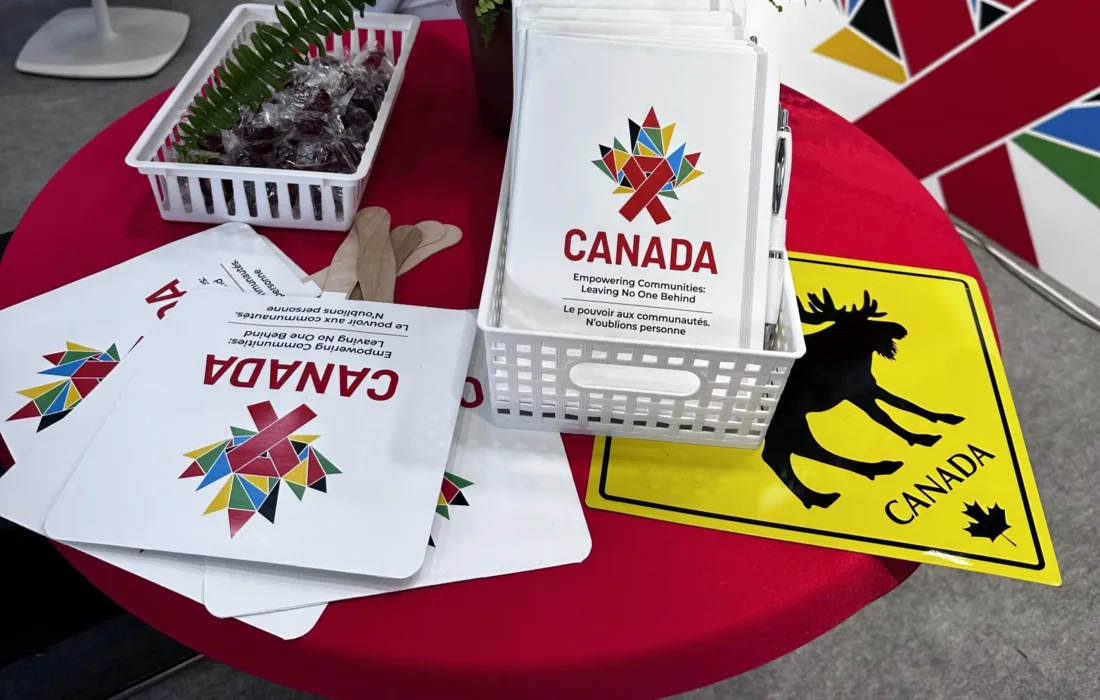Meet the 2024 Representatives, who will represent Canada Pavilion at the 25th International AIDS Conference. These Representatives will be available to answer questions, share their expertise, and highlight Canada’s innovative and inclusive approaches to HIV response. Their involvement underscores our commitment to empowering communities and leaving no one behind in the fight against HIV/AIDS.
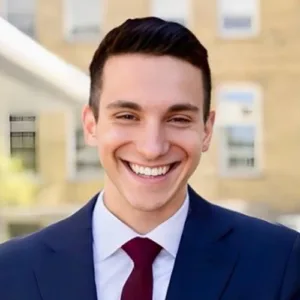
Mathew Fleury
Mathew Fleury is nēhiyawak (Plains Cree) and, as a proud member of one of the founding families of the Métis Nation, he has deep roots in the Red River Valley of Manitoba. He draws from his lived, academic, and professional experiences to apply grassroots research and policy approaches to issues impacting Indigenous peoples, including harm reduction, mental health, and accessibility. As an Indigenous Social Worker, community-based researcher, health scientist, and writer with lived experience of HIV and substance use, and as a neurodivergent, queer, and Two-Spirited individual, Mathew recognizes the need to promote the inclusion of those who have also been faced with marginalization. His passion for human rights and culture has earned him a new name, proffered by Elders in his community: Gimewan Niimi/kimiwan onîmihitow (Rain Dancer). Following studies in psychology at Queen’s University, Mathew graduated from Laurentian University’s Indigenous social work program. He then completed studies in molecular, genetic and population health sciences at Edinburgh Medical School (University of Edinburgh) alongside the World Health Organization’s Collaborating Centre for Population Health Research and Training.
As the previous Manager of Research and Knowledge Exchange at the First Nations Health Authority (FNHA), he oversaw the overall approach, design, and implementation of medium to large-scale research initiatives. He holds significant expertise in best practices around implementing the OCAP® principles; community engagement; anti-racism, and cultural safety and humility; trauma- and violence-informed approaches; Indigenous research methodologies; data analysis and visualization; and knowledge exchange, translation, and mobilization. As the Director of Indigenous Initiatives with Providence Health Care, Mathew works alongside the British Columbia Centre on Substance Use, the FNHA, the University of British Columbia (UBC) and other partners. He is also a Research Associate at the BC Centre for Disease Control, an Adjunct Professor and Ph.D. Candidate in the Faculty of Health Sciences at Simon Fraser University, and an Adjunct Professor in the Division of Social Medicine, Department of Medicine, Faculty of Medicine at UBC. Mathew is also an Instructor in the Faculty of Health and Human Services at North Island College and the School of Population and Public Health at UBC.
In addition, he is a co-founder of the Naut sa mawt Research Institute of Psychedelic Medicine, a member of the Two-Spirit Dry Lab, and a Consultant with Quintessential Research Group and Changemark Research and Evaluation. In 2024, Mathew was appointed the Chair of the Board of Directors for CAAN Communities, Alliances & Networks (formerly the Canadian Aboriginal AIDS Network). He also sits on Vancouver’s Urban Indigenous Peoples’ Advisory Committee, the 2SLGBTQ+ Advisory Committee, and the National 2SLGBTQQIA+ Committee, which aims to advance the MMIWG2SLGBTQQIA+ National Action Plan.
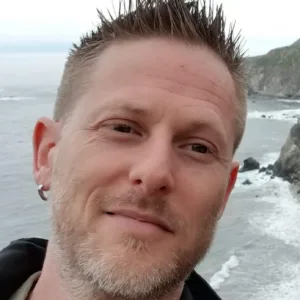
Martin Laurent
Martin has more than 14 years of lived experience with HIV as a gay white francophone cis man. He has been involved in the HIV community as project manager, board administrator, facilitator, and research collaborator since 2014. Besides participating in different peer advisory committees and projects in Quebec and Canada, he has worked more specifically with PVSQ, REZO, COCQ-SIDA, OAN and CATIE. His main focuses are on information dissemination, online learning and inspirational stories that meaningfully empower people living with HIV.
He currently manages the national alliance of the Positive Leadership Development Institute (PLDI) and is implementing a networking resource for PLDI graduates of Canada.
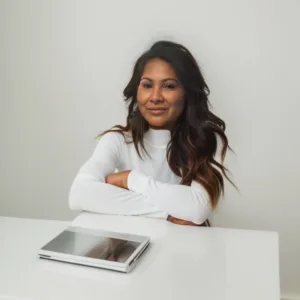
Davi Pang
With over 18 years of active engagement in Metro Vancouver’s activist community, I’ve dedicated my career to supporting many diverse groups, including Asian Canadian and immigrant communities, transgender individuals, street-based sex workers, sexually exploited youth, and survivors of violence resulting in being a founding director of the Sex Worker Action Network, now known as the Supporting Women’s Alternatives Network (SWAN). Currently, I am a Community Research Associate with the British Columbia CARMA-CHIWOS Collaboration (BCC3) study, a CIHR-funded initiative centered on women’s healthy aging from a cell to society approach. My experience in knowledge mobilization has broadened my skill set further disseminating preliminary findings and engaging with community organizations and stakeholders. www.hivhearme.ca
Equipped with certifications in first aid, non-violent crisis management, conflict resolution, and basic counseling, I’ve developed my critical thinking skills to analyze complex situations and deliver effective solutions, whether it’s navigating challenging circumstances or conceptualizing innovative approaches – I thrive on the opportunity to make a positive impact. Beyond my professional pursuits, I find joy in activities such as dancing, hiking, and reading. Yoga serves as a grounding practice, while spending time with children and my beloved puppy brings boundless happiness and fulfillment. I am delighted to represent Canada at the 2024 International AIDS Conference, bringing to the table my unique perspective as a woman of color, a refugee, and an immigrant to Canada. With exceptional interpersonal skills and a patient demeanor, I am poised to contribute meaningfully to this important global discourse.
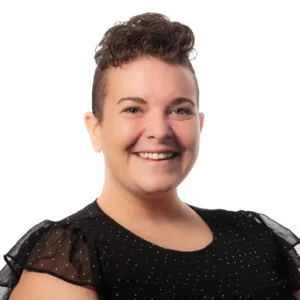
Julie Thomas
Julie Thomas is a 44 year old, Mi’kmaq woman from Paqtnkek First Nation in Nova Scotia, Canada. She was raised by a single father and her brother. Julie has three children and one grandchild.
Julie is the Program Manager for Healing Our Nations (HON). Healing Our Nations is the only Indigenous led AIDS Service organization in Atlantic Canada. HON is a program under The Union of Nova Scotia Mi’kmaq. Healing Our Nations serves 33 First Nation communities in the four Atlantic Canadian Provinces through education, prevention and awareness around HIV/AIDS and other Sexually Transmitted Blood Borne Infections.
“We are here to teach and support our people in the prevention of HIV/AIDS and related issues such as; Healthy Sexuality, Sexually Transmitted Blood Borne Infections, Hepatitis ABC, and co-infections , in a manner that is respectful to our Indigenous ways of life. We are guided on this mission by the people we help.”
Julie first started at Healing Our Nations in 2005 as a Summer student, cost sharing through her First Nations band. Once she completed her Summer placement with Healing Our Nations in 2007 she knew she wanted to return to HON to complete her student placement through the Business Administration program with a concentration in Management at The Nova Scotia Community College. She knew there was so much more she needed to and wanted to learn about HIV and the impacts it has on Indigenous people in Atlantic Canada and across Turtle Island.
After her placement she was hired on as the Hepatitis C Coordinator. In 2008 she became one of the Community Health Educators and in 2013 the Program Manager. Over the 19 years she has been working with Healing Our Nations she has participated in many local, Regional and National conferences to increase her knowledge and understanding of HIV. Through those educational opportunities she learned her passion for the movement wasn’t just about sharing information for the prevention of HIV but more so sharing knowledge about treatment, care and support opportunities with people who are living with HIV so they can increase their quality of life and help reduce the stigma associated with living with HIV/AIDS.
“I truly believe that Culturally Relevant Interactive Education is the key to preventing transmission and new infections, reducing stigma and discrimination and increasing access to treatment for HIV, Hepatitis and other Sexually Transmitted Blood Borne Infections, within our Indigenous communities across Atlantic Canada.”
“My voice is loud, my voice is powerful, my voice will be heard and can speak for those who feel they can not speak loud enough or they feel they don’t have the power to be heard”
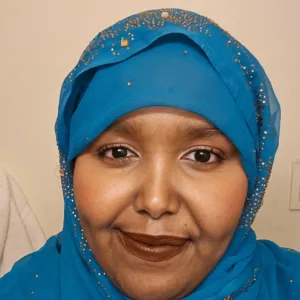
Asha Ulusow
Asha Ulusow is a passionate advocate for health equity and social justice, with a focus on addressing the complex challenges faced by marginalized communities. She is the Client & Peer Coordinator at Casey House, a hospital specializing in HIV care, Asha has spearheaded the development and implementation of an innovative peer support program. Drawing from her lived experiences as a Black, Muslim woman, Asha brings a deep understanding of the barriers and intersecting oppressions that impact access to equitable healthcare. Under her leadership, the peer program at Casey House is becoming a model for centering marginalized voices, fostering client empowerment, and culturally responsive care.
Additionally, she also serves as the Community Research and Leadership Coordinator at Women’s College Hospital where she guides various research projects ensuring community needs are at the forefront. One of these projects is the Women-Centred HIV Care Hub a groundbreaking initiative aimed at mobilizing and scaling up a women-centered HIV care model across Canada. Through this work, Asha contributes to the development of evidence-based, community-driven interventions that address the unique needs and experiences of women living with HIV.
She actively creates platforms and initiatives that elevate the voices and experiences of young BIPOC leaders and advocates, empowering them to become changemakers in their communities.
Asha is working towards:
- Driving Systemic Change within Healthcare Institutions
- Informing Evidence-Based, Inclusive Interventions
- Amplifying Marginalized Voices in Policymaking
- Promoting Peer-Based, Community-Driven Models
- Contributing to Capacity Building and Workforce Development
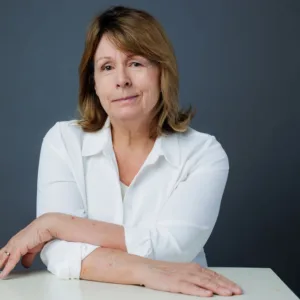
Denise Wozniak
Denise Wozniak, based in Vancouver, Canada, has been a dedicated HIV/AIDS advocate since 1994. After being diagnosed with HIV/AIDS along with her six-month-old daughter, Denise tragically lost her daughter three months later. This profound experience fueled her commitment to advocating for children living with HIV. Denise has campaigned with the BC Centre for Excellence and served on the boards of numerous HIV organizations at the local, national, and international levels. Her recent work includes significant contributions on pharmaceutical advisory boards.
As an acclaimed professional speaker and communicator, Denise is certified as a speaker coach and in the psychology of resilience, making her a powerful and inspiring representative at the Canada Pavilion for the International AIDS Conference in Munich 2024.

